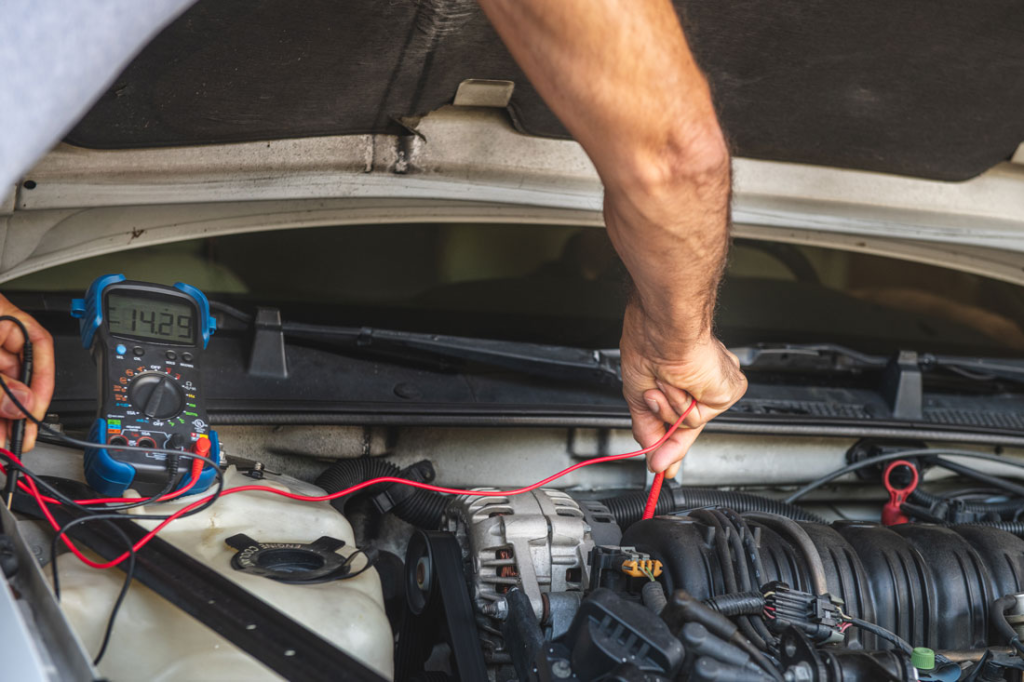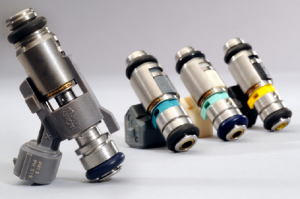Key Takeaways:
- Recognizing signs of alternator issues before they escalate.
- Importance of a mechanic’s expertise in handling alternator problems.
- Factors influencing the repair or replacement of an alternator.
- Preventative measures for maintaining the alternator’s condition.

Table of Contents:
- Signs Your Vehicle May Have Alternator Issues
- The Mechanic’s Role in Alternator Diagnostics
- Common Causes of Alternator Failure
- Repairing or Replacing: What’s the Best Course of Action?
- How a Professional Diagnosis Can Save Money and Time
- Maintenance Tips to Prolong Alternator Life
- The Future of Vehicle Charging Systems
Signs Your Vehicle May Have Alternator Issues
Automobiles rely heavily on the alternator, a critical component that charges the battery and powers electrical systems while the engine runs. One telltale sign of a failing alternator is when the dashboard warning lights illuminate, particularly the battery symbol or a message saying “ALT” or “GEN.” The alternator keeps the vehicle’s electrical components, such as the radio, dashboard lights, or infotainment system, running smoothly. When these begin to falter or fail, it’s an immediate cause for concern. Vehicle owners in colder locales, like Winter Garden where electrical demands are significant, particularly in winter due to vehicle heating systems and lights being used more frequently, should be especially vigilant. For those in such climates, professionals in alternators Winter Garden, FL, are recommended to ensure their alternators can handle these stresses. They can attest to the importance of reliability in these components.
The Mechanic’s Role in Alternator Diagnostics
Trained mechanics begin their diagnosis by conducting a series of tests, including checking the alternator’s voltage and current output. Additionally, they’ll inspect the drive belt for wear and proper tension, as a loose belt can reduce the alternator’s efficiency. Technicians are also likely to test the battery condition because a failing battery can put extra strain on the alternator, leading to premature failure. The insight and experience of a qualified mechanic are critical in diagnosing and deciding the best reparative action to take. It should also be noted that diagnosing alternator problems is not just about knowing what to look for but also understanding the vehicle-specific intricacies that can affect alternator performance.
Common Causes of Alternator Failure
Alternator failures can arise from various issues, from natural wear and tear through regular use to acute damage from an electrical surge. Over time, the alternator’s internal components, like the brushes or the voltage regulator, may wear out and require replacement. Due to corrosion or looseness, poor electrical connections can also reduce the alternator’s efficiency. Underlying issues such as a failing engine bearing can lead to alternator strain, reducing its ability to generate electricity. By understanding these potential triggers, vehicle owners are better positioned to address them before they manifest into costlier repairs or replacements.
Repairing or Replacing: What’s the Best Course of Action?
Careful consideration is taken When deciding to repair or replace an alternator. Simple repairs can sometimes resolve minor issues and restore performance. However, there are situations where replacing an old or extensively damaged alternator is more financially prudent than paying for frequent repairs. Mechanics often consider the state of the alternator. Replacement is usually recommended if it has suffered considerable overheating or has a damaged rotor or stator. It’s essential to entrust this decision to an experienced mechanic, as they can assess the particular needs of your vehicle and offer an actionable plan—whether it’s a repair or a total replacement needed.
How a Professional Diagnosis Can Save Money and Time
Skipping a professional assessment can lead to misdiagnosis and, consequently, improper solutions. Correctly identifying whether the alternator is the source of your vehicle’s troubles is key. Misdiagnosing could lead to unnecessary battery replacements or ignoring a problem that may result in a breakdown. Herein lies the value of an experienced mechanic who, with a systematic approach, can ensure a targeted repair. Ultimately, the expertise provided by a professional diagnosis can prevent glossing over a simple fix or misidentifying a major issue, thus saving vehicle owners both time and money in potential future repairs.
Maintenance Tips to Prolong Alternator Life
Proper vehicle maintenance can do wonders for the alternator’s lifespan, such as ensuring the battery you are using is the correct size and type for your vehicle—overly demanding electrical loads from the wrong battery can overwork the alternator. Frequent visual inspections can spot potential issues early, such as fraying or cracking of the alternator belt. Keeping the battery terminals clean also prevents voltage drops from impacting the alternator’s efficiency. Car owners should also be cautious of adding aftermarket accessories that could increase the electrical load on the alternator beyond its capacity. Adhering to a maintenance schedule and being conscious of the electrical demands on the vehicle can drastically reduce the necessity for alternator repairs.
The Future of Vehicle Charging Systems
The automotive charging systems arena is in flux as new technologies are introduced. With the push towards alternative energy and more efficient systems, alternators are bound to change. Innovations like regenerative braking systems in hybrid vehicles can impact the future role of alternators. Fully electric vehicles, which do not use traditional alternators, are setting precedence in the industry, signaling that the future will break from convention. It’s an exciting time for advancements in this field, and for savvy vehicle owners, staying informed about these technologies will ensure they are prepared for the automotive landscape of tomorrow.






